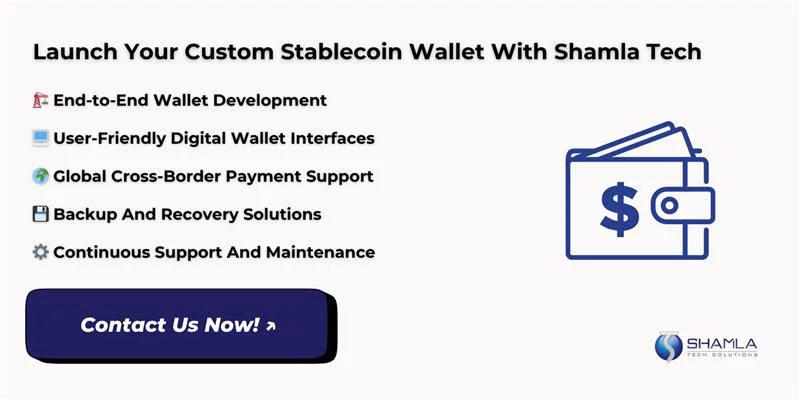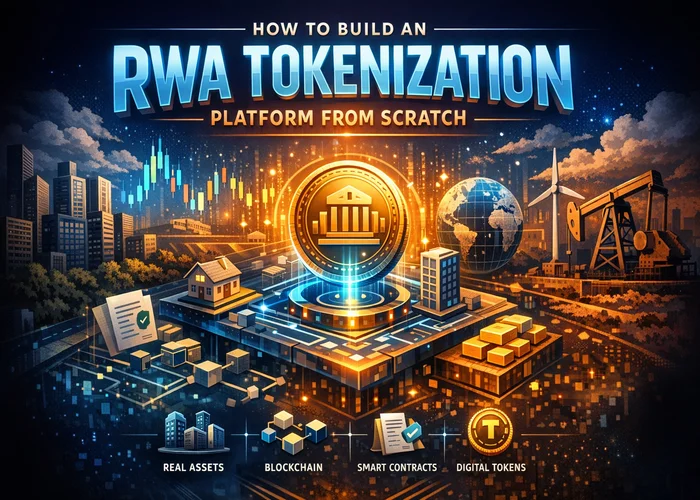Stablecoins are digital money tied to real currency. A stablecoin wallet must keep funds safe, let users send and get tokens, and show records. A stablecoin wallet needs recovery, key controls, and fast sync, fast access 24/7 so business users do not lose access. For businesses moving into DeFi, the right DeFi wallet development reduces risk, lowers costs, and speeds up payments.
Choose a stablecoin development company that builds tested systems with clear rules and support. A focused wallet makes accounting, audits, and user trust easier. Build for backups, secure signing, and logs to keep business money moving without delay.
The Rise of Stablecoins and Their Role in Modern Finance
What Stablecoins Are And How They Work
Stablecoins are tokens tied to real money or assets to keep value steady. They follow set rules: some hold cash reserves, others hold crypto reserves, and some use code that changes supply to match demand. Price feeds called oracles give market data so smart contracts can mint or burn tokens when needed.
Businesses use a stablecoin wallet to store tokens, show proof of reserves, and log payments. Developers build clear minting flows, regular audits, and emergency pause controls to handle problems and protect funds. This setup supports accounting, audits, compliance, and trust quickly.
Stablecoins For Payments And Cross-Border Transfers
Stablecoins let value move on blockchains without traditional bank rails. They settle on-chain in seconds, cut fees, and remove correspondent bank steps. Businesses use stablecoin wallet features to receive payments fast and reconcile accounts immediately. For global sales, a multi-currency wallet holds different fiat-pegged tokens so buyers pay in local tokens while sellers get a chosen stable token.
This reduces forex risk, speeds procurement, and lowers cash conversion steps. Firms must pair wallets with on-chain reports and exportable ledgers for audit and tax workflows. Use bank on-ramps and regulated custody to meet compliance requirements.
Stablecoins In DeFi: Lending, Markets, And Liquidity
Stablecoins act as base currency in DeFi pools, lending platforms, and automated market makers. Traders use stable pairs to reduce slippage and keep capital predictable. Protocols rely on clear collateral rules and transparent reserves to avoid runs. Decentralized stablecoin development focuses on open governance, on-chain audits, and permissionless access.
For safety, stablecoin smart contract development must include safe minting limits, oracle checks, and pause mechanisms. Integrations need standard token interfaces and liquidity hooks so protocols can route trades and provide deep liquidity without breakdowns. Third-party auditors must track reserve ratios and oracle drift.
Scaling Wallet Infrastructure For Business Use
Enterprise wallets must handle thousands of users while keeping keys safe and transactions fast. Use layer-2 rollups, batch settlement, and indexed ledgers to cut gas costs and raise throughput. Decentralized stablecoin development links bridges and standard APIs so tokens move across chains reliably.
Choose secure crypto wallet designs with hardware key stores, threshold signatures, and offline backups. A robust partner offers stablecoin development solutions that include monitoring dashboards, incident playbooks, and compliance modules for KYC and AML. Integrate accounting exports so finance teams reconcile on time.
Why Businesses Need a Custom Stablecoin Wallet App
Security And Key Management
A business-grade stablecoin wallet must keep private keys safe and make it simple to sign transactions. Use split keys so no single person can move funds alone, hardware key stores for the main keys, and a separate online key for day-to-day moves. Add clear recovery steps, automatic backups, and signed logs for every action.
The same design choices from blockchain wallet development apply: limit online exposure, require multiple approvals for large transfers, and test key rotation often. These steps stop theft, let compliance teams trace events, and keep customer funds available when needed.
Compliance And Auditability
Enterprises need clear records and controls built into each stablecoin wallet. Add on/off ramps that tie to KYC checks, exportable ledgers for accounting, and real-time alerts for odd transfers. Use role-based access so finance, ops, and auditors see only what they need.
For banks and fintech, stablecoin development for fintech should include tax reports, proof-of-reserve links, and easy audit trails. These features let firms prove where money came from and where it went, meet regulator requests fast, and run internal checks without manual work.
Branding And User Experience
A custom wallet development approach lets firms keep their look and control features. Deliver a simple sign-up, clear balance views, instant send/receive flows, and options for a multi-currency wallet so users hold different fiat-pegged tokens.
Offer SDKs and APIs so partners embed the stablecoin wallet app inside existing apps. Make onboarding short, give quick help for payments, and let admins set fees and limits. Good design cuts support load, raises conversion, and fits each business process without forcing customers to learn new tools.
Scalability And Real-World Use Cases
Build wallets to handle high volume: batch transactions, use add-on networks that carry many moves at once, and keep an indexed ledger for fast queries. For remittance firms, a stablecoin wallet speeds payouts and cuts bank fees. For trading firms, it provides a steady settlement unit and fast settlement between venues.
For payroll, automating repeats saves time and reduces errors. Offer a stablecoin wallet app with monitoring dashboards and failover paths so teams see problems early and keep services running during network slowdowns.
Key Features of a Secure and Scalable Stablecoin Wallet
1. Strong Key And Access Controls
Protect the stablecoin wallet by using split keys and clear roles. Keep main keys in hardware devices and use a separate online key for small payments. Require two or more approvals for big moves and set time limits on approvals. Log every action and keep signed records for audits. Use short-lived session tokens and step-up checks for risky actions.
This setup builds a secure crypto wallet that limits exposure and helps teams trace problems quickly. When teams build DeFi wallet development, they must test key rotation and recovery steps under live scenarios to avoid outages.
2. Cross-Border Payments And Currency Support
A business needs fast moves across borders. A multi-currency wallet holds several fiat-pegged tokens so customers pay in local tokens and businesses settle in one chosen token. Combine on and off ramps to link bank accounts and exchanges. Use automated clearing for invoices and exportable ledgers for finance teams.
Add support for cross-chain stablecoin solutions so tokens move between chains without losing value. These paths cut conversion steps and lower fees. Build APIs so partners push and pull balances. Good crypto wallet solutions let firms settle and keep books straight. This design reduces conversion friction.
3. DeFi Integration And Market Liquidity
A wallet must fit into lending, swaps, and pools with clear rules. Let traders use a stablecoin wallet as base currency and link to liquidity pools. Add token approval checks, gasless transaction options, and price oracles for accurate rates. Protect funds with a secure crypto wallet design that uses hardware signing and multi-person approvals.
Include hooks for routers and price feeds so the app can tap deep liquidity. Use AI-powered stablecoin development tools to spot price drift and suggest rebalancing. These steps keep trade flows smooth and cut settlement delays and cut margin call events.
4. Monitoring, AI, And Cross-Chain Bridges
Run live monitors for balances, latency, and oracle health so ops staff see issues fast. Use AI-powered stablecoin development to flag odd patterns, predict fee spikes, and auto-tune gas strategies. Provide alert playbooks and auto-rollbacks for failed batches.
Add cross-chain stablecoin solutions with vetted bridges and relayers that check proofs before moving tokens. Keep reconciliation tools that match chain records to accounting ledgers. Firms that add these layers cut downtime and avoid lost funds. Teams fix faults, keep funds.
Why Shamla Tech is the Best Stablecoin Wallet Development Company
Why Shamla Tech Leads in Stablecoin Wallet Development:
- Security-first builds use hardware keys, split signatures, and runbooks. We deliver an enterprise crypto wallet that logs every move and meets audit checks and alerts.
- Cross-chain rails and vetted bridges come standard. Our crypto wallet solutions pair with blockchain wallet development best practices to keep transfers fast and provable today.
- User flows and APIs are simple. Our digital wallet development includes a branded stablecoin wallet app with easy SDKs, web hooks, and accounting exports ready.
- Enterprise-ready ops and SLAs back every product. Our digital wallet development ties to custody partners and builds an enterprise crypto wallet with a live monitoring dashboard.
- Choose Shamla Tech as your stablecoin development company for clear roadmaps. Our crypto wallet solutions include APIs, staff training, and post-launch incident response and audits.
Conclusion
Expert wallet development helps businesses handle digital payments safely and at scale. A stablecoin wallet built with clear code and tested controls ensures trust, fast transfers, and compliance in growing DeFi systems. Proper DeFi wallet development gives firms reliable rails for secure digital value flow and user control over assets.
Shamla Tech is a trusted stablecoin development company delivering complete solutions for building secure crypto wallet systems. Our stablecoin development team designs, audits, and maintains business-grade platforms with full support for DeFi, enterprise, and fintech needs. Every deployment focuses on speed, safety, and growth readiness for future digital payment networks.
Contact Us Today To Build Your Own Stablecoin Wallet!










